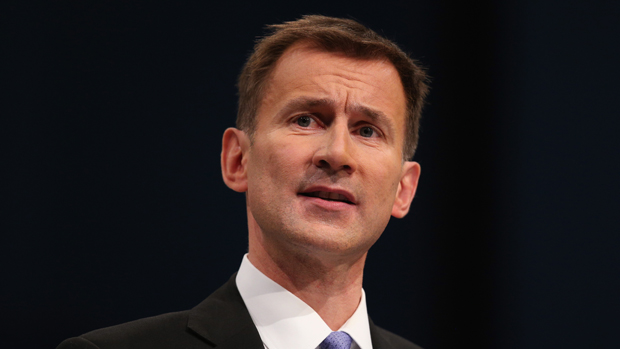Can Jeremy Hunt save the Iran nuclear deal?
The Foreign Secretary is seeking to ease tensions amid fears that the 2015 accord is on the verge of collapse

A free daily email with the biggest news stories of the day – and the best features from TheWeek.com
You are now subscribed
Your newsletter sign-up was successful
Jeremy Hunt has vowed to “do what it takes” to save the nuclear deal with Iran in the face of mounting tensions between Tehran and the EU.
The Foreign Secretary suspended his Tory leadership campaign to travel to Brussels today for talks with his EU counterparts about how to “encourage Iran back into compliance” and rescue a deal that many fear is close to collapse. Hunt originally planned to send a junior minister for the Foreign Affairs Council meeting, at which Iran will be top of the agenda, but decided the “urgent” situation called for him to attend in person, The Times reports.
In a joint statement ahead of the meeting, Britain, France and Germany reiterated their support for the deal, officially known as the Joint Comprehensive Plan of Action.
The Week
Escape your echo chamber. Get the facts behind the news, plus analysis from multiple perspectives.

Sign up for The Week's Free Newsletters
From our morning news briefing to a weekly Good News Newsletter, get the best of The Week delivered directly to your inbox.
From our morning news briefing to a weekly Good News Newsletter, get the best of The Week delivered directly to your inbox.
Why have tensions with Iran risen?
The 2015 deal allowed Iran some sanctions relief in exchange for limits on its nuclear programme, but was thrown into turmoil last year when Donald Trump controversially withdrew the US from the agreement and reimposed harsh sanctions on Tehran, The Independent says.
While EU leaders have maintained their commitment to working with Iran, their failure to ease the burden of US sanctions has led Iran to breach both the deal’s limits on uranium enrichment and on stockpiled uranium in the last month.
Britain in the spotlight
A free daily email with the biggest news stories of the day – and the best features from TheWeek.com
The UK’s relationship with Iran has come under further strain over the past two weeks after Royal Marines in Gibraltar detained an Iranian oil tanker believed to have been headed for Syria, in breach of EU sanctions. Tehran denied that Syria was the intended destination of the tanker and, in apparent retaliation, “attempted to impede” a British oil tanker in the Strait of Hormuz.
Seeking to defuse conflict over the incidents, the Foreign Secretary said on Saturday that the detained Iranian tanker could be released if the UK were to receive a guarantee that the oil is not bound for Syria, reports the BBC. Hunt said that following “constructive” talks with the Iranian foreign minster, Javad Zarif, he was confident that Iran had no desire to escalate the situation.
However, Iranian officials called the boarding of the country’s tanker “piracy”, and claimed that EU sanctions could only apply to the bloc’s members, not Iran.
What is Hunt promising?
On his way to today’s meeting in Brussels, Hunt said: “Iran is still a good year away from developing a nuclear weapon. We think there is still a closing, but small, window to keep the deal alive.”
However, he also warned that if different parties in the “unstable” Middle East were armed with nuclear weapons “it would represent an existential threat to mankind”, reports The Guardian. Hunt said that his goal is to “reduce not raise” tensions in the region, but also reiterated that while EU leaders supported the deal, there was no room for “partial compliance” with it.
-
 How corrupt is the UK?
How corrupt is the UK?The Explainer Decline in standards ‘risks becoming a defining feature of our political culture’ as Britain falls to lowest ever score on global index
-
 Best places to find snowdrops in the UK
Best places to find snowdrops in the UKThe Week Recommends The snowdrop season is upon us, with ‘blankets’ of the beautiful bloom signalling that spring is on its way
-
 The 8 best superhero movies of all time
The 8 best superhero movies of all timethe week recommends A genre that now dominates studio filmmaking once struggled to get anyone to take it seriously
-
 Epstein files topple law CEO, roil UK government
Epstein files topple law CEO, roil UK governmentSpeed Read Peter Mandelson, Britain’s former ambassador to the US, is caught up in the scandal
-
 Iran and US prepare to meet after skirmishes
Iran and US prepare to meet after skirmishesSpeed Read The incident comes amid heightened tensions in the Middle East
-
 Which way will Trump go on Iran?
Which way will Trump go on Iran?Today’s Big Question Diplomatic talks set to be held in Turkey on Friday, but failure to reach an agreement could have ‘terrible’ global ramifications
-
 Grok in the crosshairs as EU launches deepfake porn probe
Grok in the crosshairs as EU launches deepfake porn probeIN THE SPOTLIGHT The European Union has officially begun investigating Elon Musk’s proprietary AI, as regulators zero in on Grok’s porn problem and its impact continent-wide
-
 Israel retrieves final hostage’s body from Gaza
Israel retrieves final hostage’s body from GazaSpeed Read The 24-year-old police officer was killed during the initial Hamas attack
-
 China’s Xi targets top general in growing purge
China’s Xi targets top general in growing purgeSpeed Read Zhang Youxia is being investigated over ‘grave violations’ of the law
-
 Panama and Canada are negotiating over a crucial copper mine
Panama and Canada are negotiating over a crucial copper mineIn the Spotlight Panama is set to make a final decision on the mine this summer
-
 Iran unleashes carnage on its own people
Iran unleashes carnage on its own peopleFeature Demonstrations began in late December as an economic protest